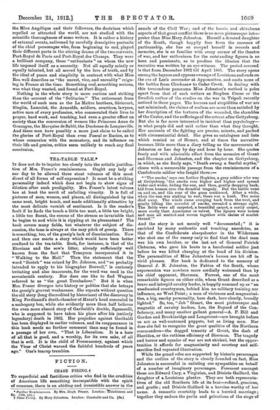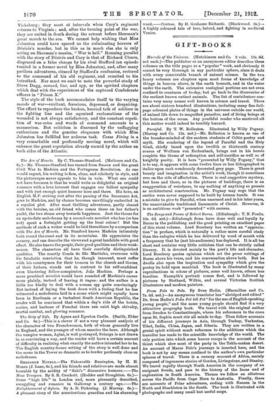FICTION.
CEASE FIRING.t To superficial and fastidious critics who find in the crudities of American life something incompatible with the spirit of romance, there is an abiding and irresistible answer in the
• Further Reminiscences. By Mrs. Hugh Fraser. London: .rutchinson and Co. [las. net.] t Cease Firing. By Mary Johnston. London: Constable and Co. LSa]
annals of the Civil War ; and of the heroic and chivalrous aspects of that great conflict there is no more picturesque inter preter than Miss Mary Johnston. Herself a devoted daughter of the South, though happily free from the excesses of partisanship, she has so steeped herself in records and memoirs, she is so familiar with every corner of the theatre of war, and her enthusiasm for the outstanding figures is so keen and passionate, as to produce the illusion that the narrative was written by an eye-witness. The period covered ' is that from December 1862 till April 1865. The story opens among the bayous and cypress swamps of Louisiana and ends on the eve of Lee's surrender at Appomattox, and omits none of the battles from Chickasaw to Cedar Creek. In dealing with this tremendous panorama Miss Johnston's method is poles apart from that of such writers as Stephen Crane or the Swedish author of the studies on the war in Tripoli recently noticed in these pages. The horrors and stupidities of war are not minimized; the claims of realism are more than satisfied by her description of the tortures of the wounded, the shambles of the Crater, and the sufferings of the retreat after Gettysburg. But she is far more interested in incident than psychology— in what people did and said rather than what they thought. Her accounts of the fighting are precise, minute, and packed with circumstantial detail. She gives us catalogues and lista which remind us of Homer, and at times the narrative becomes little more than a diary telling us the movements of Johnston or Lee day by day and hour by hour. She quotes freely and with admirable effect from the memoirs of Grant and Sherman and Johnston, and the chapter on Gettysburg, in which, as she finely says, "Death swung a fearful scythe," closes with a memorable passage from the reminiscences of a Confederate soldier who fought there :—
" The smoke,' says one Luther Hopkins, a grey soldier who was at Gettysburg, 'the smoke rose higher and higher and spread wider and wider, hiding the sun, and then, gently dropping back. hid from human eyes the dreadful tragedy. But the battle went on and on, and the roar of the guns continued. After a while, when the sun was sinking to rest, there was a hush. The noise died away. The winds came creeping back from the west, and gently lifting the coverlet of smoke, revealed a strange sight. The fields were all carpeted, a beautiful carpet, a costly carpet, more costly than Axminster or velvet. The figures were horses and men all matted and woven together with skeins of scarlet thread.'"
And the story is not merely well " documented ; " it is enriched by many authentic and touching anecdotes, as that of the Confederate sharpshooter in the Wilderness who shot one of the enemy only to find that the dead man was his own brother, or the last act of General Patrick Cleburne, who gave his boots to a barefooted soldier just before be was killed charging at the head of his division.
The personalities of Miss Johnston's heroes are hit off in
vivid phrases. Her book is dedicated to the memory of General J. E. Johnston, the Fabius of the South, whose
supersession was nowhere more cordially welcomed than by his chief opponent, Sherman. Forrest, one of the most remarkable figures on either side, whom Grant described as a brave and intrepid cavalry leader, is happily summed up as " an uneducated countryman, behind him no military training nor influence, no West Point ; a man of violences and magnanimi- ties, a big, smoky personality, here dark, here clearly, broadly lighted." So, too, "Jeb " Stuart, the most picturesque and magnetic of cavalry leaders, Lee, the Bayard of the Con- federacy, and many another gallant general—A. P. Hill and Gordon and Breckinridge and Longstreet—are brought before us not as well-costumed puppets, but as living men. Nor does she fail to recognize the great qualities of the Northern commanders—the dogged tenacity of Grant, the dash of Sheridan, or the ruthless efficiency of Sherman. The tragedy and horror and squalor of war are not shirked, but the oppor- tunities it affords for magnanimity and courtesy and self. sacrifice find repeated illustration.
While the grand roles are supported by historic personages and the outline of the story is closely founded on fact, Miss
Johnston is successful in enlisting our sympathies on behalf of a number of imaginary personages. Foremost amongst these are Edward Cary, a Virginian, and Desiree Gaillard, the daughter of a Louisiana planter. They are both representa- tives of the old Southern life at its best—refined, gracious, and gentle ; and Desiree Gaillard is a heroine worthy of her name. A romantic courtship leads to a hurried marriage ; together they endure the perils and privations of the siege of
Vicksburg ; they meet at intervals when Cary's regiment returns to Virginia ; and, after the turning point of the war, they are united in death during the retreat before Sherman's great march to the sea. We cannot help wishing that Miss Johnston could have spared ns the culminating horrors of Desiree's murder, but in this as in mach else she is only acting on Sherman's maxim, " War is hell." Running parallel -with the story of Desiree and Cary is that of Richard Cleave, disgraced on a false charge by his rival Stafford (an episode treated in a former novel by Miss Johnston), and, after many perilous adventures, cleared by Stafford's confession, restored to the command of his old regiment, and reunited to his betrothed. Nor must we omit to note the powerful study of Steve Dagg, coward, liar, and spy, or the spirited chapters -which deal with the experiences of the captured Confederate officers in "Prison X."
The style of the book accommodates itself to the varying moods of war—exultant, ferocious, depressed, or despairing. The effort to reproduce the broken, hurried talk of soldiers in the fighting line and the agonized exclamations of the wounded is not always satisfactory, and the constant repeti- tion of war-cries and words of command amounts to a mannerism. But criticism is disarmed by the unflagging enthusiasm and the genuine eloquence with which Miss Johnston has fulfilled her arduous task. Cease Firing is a very remarkable and profoundly moving novel, which will enhance the great reputation already earned by the author on both sides of the Atlantic.











































 Previous page
Previous page